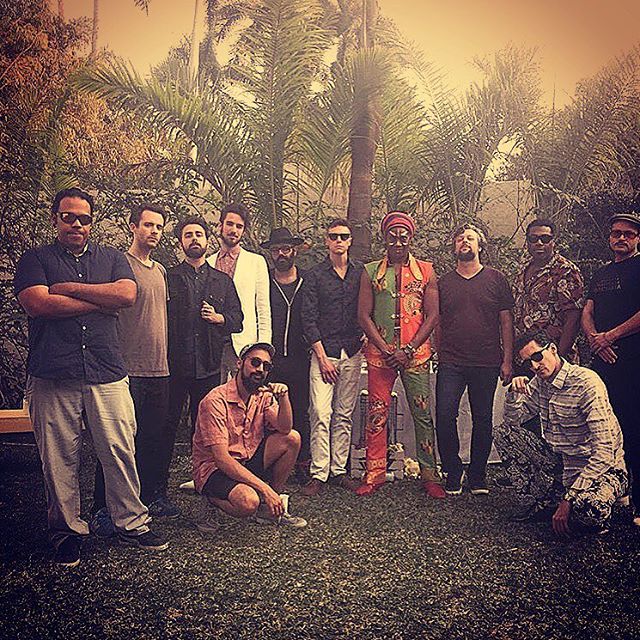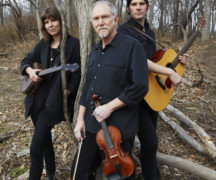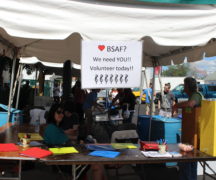By DAVID DUPONT
BG Independent News
Martin Perna, founder of the Afro-beat ensemble Antibalas, likes company.
“Community is really important to me,” he said in a recent telephone interview. Whether it’s “connecting people as a leader, a facilitator, or just a participant, what we’re able to achieve together is way bigger than any individual could do.”
That holds especially true for Afrobeat, an amalgamation of jazz, soul, psychedelic rock, African highlife, and traditional chants and rhythms. The cast of a dozen musicians allows the songs to expand to 20 to 30 minutes. “It allows for the development of a complex story,” Perna said.
A pop song may be a tweet, but an Antibalas song with its surging cross-rhythms and jubilant horns is “an in-depth article,” even a novel.
That’s evident on the group’s forthcoming album “Where the Gods Are in Peace,” a throbbing exploration of myths for our time. Antibalas will mark the release of the album, which hits the streets Sept. 15, with a show at the Black Swamp Arts Festival, Saturday, Sept. 9 at 10 p.m.
Percussionist and charter member Duke Amayo said he’s excited about the show and the tour because the album speaks about solutions to some of the problems the world is facing rather than just talking about the problems.
The band’s publicity says of the album: “Through its battle cry of resistance against exploitation and displacement, Antibalas’ long-form compositions investigate oppression in 1800s America that eerily mirror the current state of the country. Three explosive original arrangements cultivate an urgent call to heal a broken system.”
“What we try to do in the music is imagine solutions,” Perna said. “Talking about the same problems in the same way is not going to get us anywhere.”
Perna said that meeting Amayo was one of the catalysts for bringing Antibalas together 20 years ago in Brooklyn.
Perna, who plays saxophones and flute, had tight circle of friends from his career in music that included a stint with the Dap Kings, the band that accompanied Sharon Jones.
When Afrobeat pioneer Fela Kuti died in 1997, Perna was concerned the music would die with him. Perna had first heard the sound through samples used in hip hop. He connected both with the music’s groove and its call for social justice.
He drew on his connections to enlist musicians interested in exploring the Afrobeat as well as some who had years of experience playing it. Pulling that many musicians together who had the skill to carry it off was not easy, but worth it.
It was a mission, Amayo said. Those early years formed a foundation, and a structure worth maintaining. “Once you get that calling, it’s going to be a lifetime of work. … We’ll pass it on. The things we are fighting for are about our life. This is our lifetime’s work.”
“Afrobeat,” Perna said, “is very holistic music. It offers possibilities for the body, the mind, and the spirit. It has that balance – music you can have a physical experience, a musical experience, a spiritual experience, and an intellectual kind of conscientious, critical experience to it.”
That the band is sharing this multidimensional experience with “multigenerational audience is really exciting,” Perna said. The variety of ages tends to make people more “present” in the moment, he said. Elders in their 70s are not “totally addicted” to their cell phones, and kids run around “feeling the beat.”
The concert becomes a time “when people put away the self-conscious stuff and realize there’s something more important than how other people perceive them.”
For the band, it’s exciting to connect with people of all ages. “It means a lot more than being popular with your own age group,” Perna said.
Keeping a 12-piece band together for 20 years has been difficult, especially as the members age and take on new family responsibilities. “We’ve been underpaying ourselves for years,” he said. But to charge more would mean some people couldn’t afford to hear them.
It takes “resilience and togetherness,” and the determination “to keep it going,” Amayo said.
Sharing the festival stage with The Blind Boys of Alabama, who have been going for 70 years, is “inspiring,” Perna said.
“It sets a precedent. It’s really important now when we lose so much memory from one generation to the next to have things that are meant to last and to pass knowledge from one person to another, and at the same time have that fresh energy ,new ideas, the recklessness and danger that younger people have. You need a balance of the two.”





